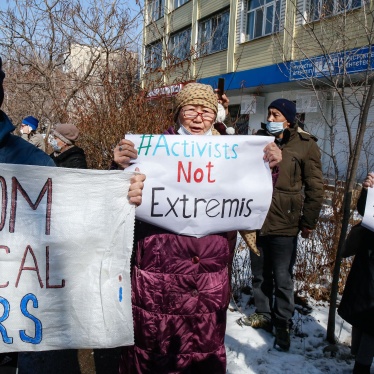Dr. Werner Hoyer
President
European Investment Bank
Luxembourg
Azerbaijan: Human rights concerns over EIB loan to TANAP and TAP
Dear President Hoyer,
We are writing to urge the European Investment Bank (EIB) to take into account the Azerbaijan government’s sustained and vicious crackdown against the country’s civil society, and link the bank’s further investment in Azerbaijan to concrete rights improvements, in compliance with the principles of EU External Action as set out in Article 21 of the EU treaty, and to ensure the EIB respects its obligations under the EU Charter of Fundamental Rights.
We understand that at the February 6 board meeting, the EIB is likely to move further in its deliberations on whether to provide 1.5 billion euro in financing for the Trans-Adriatic Pipeline (TAP). We also understand that at a subsequent session the Board may discuss financing for the Trans Anatolian Pipeline (TANAP). Both pipelines form part of the Southern Gas Corridor, and would bring Caspian Sea natural gas to Europe. The government of Azerbaijan and its state-owned oil company SOCAR own 20 percent of TAP and 58 percent of TANAP.
For nearly five years, the government of Azerbaijan has sustained a sweeping campaign to intimidate, punish, and silence its critics. In our November 2016 letter to you, attached here, we described the government’s efforts to paralyze civil society through jailing critics on bogus, politically motivated criminal charges; imposing regulatory restrictions on nongovernmental organizations that make it impossible to attract and use independent funding; retaliating against critics by harassing their family members; and driving independent lawyers away from the courts through false accusation, leading to disbarments.
Some of these government actions led the Extractive Industries Transparency Initiative to suspend Azerbaijan’s membership in March 2017, after two years of EITI warnings to the government that it needed to comply with initiative’s standards. After the suspension, the government of Azerbaijan left the initiative, claiming it would uphold revenue transparency on its own initiative.
In the year since our last letter to you, the government’s patterns of repressing civil society have regrettably not changed. We describe these patterns in our new World Report, published last week. We are attaching the report’s Azerbaijan chapter. Dozens of journalists and activists convicted in politically motivated trials remain in prison. Among them is Ilgar Mammadov, leader of the pro-democracy opposition movement Republican Alternative (REAL), and a former member of the Advisory Board of the Natural Resource Governance Institute, which is an EITI member. The government continues to defy two European Court of Human Rights (ECtHR) judgments that found his 2013 imprisonment illegal, and failed to comply with repeated demands by the Council of Europe Committee of Ministers to immediately release him. In December 2017, the Council of Europe initiated legal proceedings against Azerbaijan for this blunt refusal to implement the ECtHR judgement.
In December, a court in Azerbaijan sentenced journalist Afgan Mukhtarli to six years in prison on bogus smuggling and other charges, after he had been kidnapped in neighboring Georgia, where he had been living in exile out of fears for his safety. Other journalists convicted in recent months include Mehman Huseynov, one of the country’s most popular bloggers, and Afgan Sadigov, editor-in-chief of a news website who had often reported on allegations of embezzlement of social benefits by local authorities. At least seven other journalists convicted in previous years remain behind bars.
In January 2017, under pressure from EITI, the government adopted minor changes to certain regulations on international donor funding and grant agreement registration or the entrenched legal barriers to NGOs’ operations. The revisions did not eliminate the authorities’ discretion to arbitrarily deny obligatory grant registration: regulations continue to require a positive assessment from the Finance Ministry for each grant from a foreign donor, and require foreign donors to get permission from the government to make a grant. EITI’s decision in March to suspend Azerbaijan’s membership indicates how superficial the changes were.
The EIB’s obligations under the EU Charter of Fundamental Rights mean it should not finance projects that would encourage or support human rights violations.
Supporting the TAP and TANAP project despite the ongoing repressive climate in Azerbaijan, and the government’s repeated violation of its own human rights obligations, would contravene the EIB’s commitments to respect human rights, to maximize social well-being through the projects it finances, and its emphasis on the importance of civil society in development decisions and holding governments to account. The Azerbaijani government’s actions against civil society are a serious impediment to these principles and thus to inclusive, sustainable development.
For these reasons, we urge the EIB to abstain from providing additional financing for TAP and TANAP and suspend their consideration until the government of Azerbaijan has:
- Dropped regulations that require nongovernmental organizations to obtain government approval for grants, and until it has demonstrated that it will allow civil society to play the robust role in development that the EIB embraces.
- Released the journalists and civil society activists it has wrongly imprisoned on politically motivated charges in retaliation for their work.
We also ask the EIB, through its diplomatic engagement with the Azerbaijani government and in public statements, to raise concerns about the continued crackdown on independent civil society, emphasizing how the crackdown undermines inclusive, sustainable development.
Thank you for your consideration of this important matter.
Sincerely,
Hugh Williamson
Director, Europe and Central Asia Division
Human Rights Watch
Kate Watters
Executive Director
Crude Accountability
Brigitte Dufour
Director
International Partnership for Human Rights
CC: Members of the Board of Directors of the European Investment Bank







